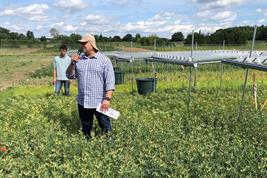01.07.2024

On June 18, 2024, the Grain Legume Field Day was held in Müncheberg, Germany, organized this year by the Society for the Promotion of Lupine (Gesellschaft zur Förderung der Lupine, GFL). The day was primarily aimed at a specialist audience, including representatives from breeding companies, seed producers and retailers. In total, around 50 people attended the event. The focus was on exchanging breeding objectives and strategies for lupin with growers and research institutions.
The event began with a welcome from Dr. Thomas Eckardt of the GFL. Rebecca Thoma (GFL), Martin Kind and Elisabeth Berlinghof (both ZALF) then presented LeguNet. The network consists of growers and processors and develops strategies to improve the added value of grain legumes. Brandenburg is one of the most important lupin growing areas in Germany. Of the grain legumes, only peas occupy a larger area. However, only 7.5% of the lupins grown in Germany are currently used for human consumption.
Tour of the field trials and history of ZALF
The participants then visited the field trials with blue, yellow and white lupins as well as other grain legumes such as chickpeas, lentils, grass peas and dry beans. The trials are part of a long historical tradition at the research site: A bitter-free fodder lupin, known as the sweet lupin, was bred here as early as 1929.
Moritz Reckling, Mosab Halwani and Jéssica Bubolz led the trials on drought stress, harrowing and hoeing variants and different varieties. In the drought stress trials, the white lupins performed surprisingly well, although they are not normally recommended for light soils. A yellow lupin, not yet on the market, is also seen as having great potential for human nutrition. ;
Presentation of the patchCROP landscape laboratory and practical insights
Kathrin Grahmann presented the patchCROP landscape laboratory, where small-scale, diverse cultivation is being tested, including the use of field robots. In patchCROP, lupins are grown in rotation on lighter soils.
The challenges of growing lupin due to disease and weed pressure were discussed while inspecting the crops. The impressions and experiences were complemented by Thomas Kunze from the JKI Kleinmachnow. The scientist and his team monitor plant diseases and pests in addition to the field trials.
Organizer
Society for the Promotion of Lupine (GFL) and LeguNet in cooperation with the Leibniz Centre for Agricultural Landscape Research (ZALF) e. V.
Funding:
LeguNet is funded by the German Federal Ministry of Food and Agriculture (BMEL) on the basis of a resolution of the German Bundestag as part of the BMEL's strategy for protein crops.
Further Information:
